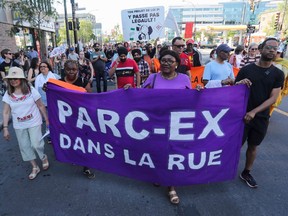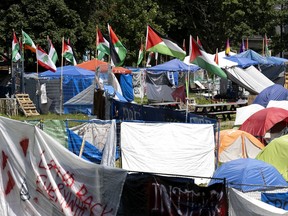[ad_1]
Breadcrumb Trail Links
Real Estate Quebec Local News
They say Bill 31 is a cherry on top of the sundae for recalcitrant landlords.

Article content
Hundreds of Montrealers took to the streets of Parc-Extension Thursday evening to denounce a law they say will put too much power in the hands of landlords.
Advertisement 2
Article content
“The government is working more for the rich people who are making a lot of money with real estate, increasing rents,” said Parc-Extension resident Judith Wong. “The poor people who can’t afford it, we’re the ones who are suffering.”
Article content
The protest was one of many held throughout the province called “An evening of action against rent hikes and evictions.” The march began at the Jean-Talon métro station and protesters wound their way through the streets of Parc-Extension, including Jean-Talon and Jarry Sts.
Amid a housing crisis, activists representing housing groups say Bill 31 will allow landlords to refuse to allow a tenant to assign a lease to another renter before the end of its term. The groups say this will lead to more abusive increases in rents.
Article content
Advertisement 3
Article content
“This is one of the few means that curtails housing discrimination and helps keep rents affordable,” said Amy Darwish, of the group Comité d’action Parc-Extension.
Darwish said Parc-Extension is one of the neighbourhoods that has been most seriously affected by the housing crisis, with unjustified rent hikes and renovictions. Many residents of the neighbourhood are newly arrived immigrants and don’t know their rights, so landlords take advantage of that, she said.
Mélanie Baril, another resident of Parc-Extension, said the neighbourhood has gone through many changes, and the construction of the MIL Campus of Université de Montréal in neighbouring Outremont has put added pressure on rents.
“I’m lucky, because I live in a housing co-op, but in the last 15 years, I saw the transformation of this neighbourhood, and rents are much less affordable than in the past,” Baril said.
Advertisement 4
Article content
The neighbourhood has among the highest concentrations of immigrants in the country, but the rental increases are forcing people to move out of the borough, or to make difficult arrangements.
“It’s also becoming more complicated for them to find adequate housing,” Baril said. “We see sometimes two or three families sharing an apartment.”
Cédric Dussault, a co-spokesperson for Regroupement des comités logement et associations de locataires du Québec (RCLALQ), was wearing a blue T-shirt with a picture of Housing Minister France-Élaine Duranceau edited to look like Marie Antoninette. The T-shirt read: “Let them invest in housing.”
He was referring to comments Duranceau made that drew criticism, saying that if tenants wanted the right to determine who lives in a building, they should buy property.
Advertisement 5
Article content
“The law was already a slap in the face, and it shows she has a lack of understanding about the housing crisis,” Dussault said. “The lease transfer is the last annoying pebble in the shoes of landlords to be able to change tenants and hike rents. Without this, they can merely dictate the rents.”
He decried that Duranceau met many times with property owners but has not met with his group or others representing housing groups.
In addition to cancelling the clause about lease transfers, the groups are calling on the province to significantly boost funding for new social housing projects.
jmagder@postmedia.com
twitter.com/jasonmagder

Quebec bill would let landlords break leases to block transfers

Quebec housing minister apologizes for remarks about lease transfers
Article content
Share this article in your social network
[ad_2]
Source link





















